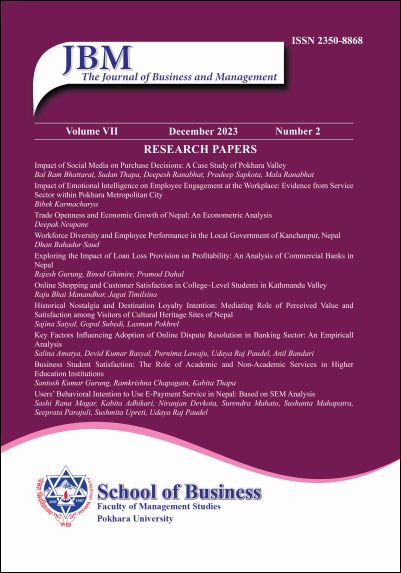Key Factors Influencing Adoption of Online Dispute Resolution in Banking Sector: An Empirical Analysis
DOI:
https://doi.org/10.3126/jbm.v7i02.62590Keywords:
Alternative dispute resolution, behavioral intention, grievances, online dispute resolution, partial least square structural equationAbstract
Background: Online dispute resolution system helps banks to reduce expenses and time associated with dispute resolution while enhancing client satisfaction and loyalty However, it faces several challenges necessitating the establishment of standards to ensure consistency and security.
Objectives: Many online dispute resolution (ODR) services like email, chat, and video conferencing offer global grievance solutions, yet individuals face challenges due to diverse regulations, leading to security, privacy, and connectivity issues. Thus, this study aims to understand how customers perceive online dispute resolution for resolving banking issues.
Methods: The research adopts an explanatory research design and employs a convenient sampling method for data collection. It's grounded in the Unified Theory of Acceptance and Use of Technology theory. A total of 403 data points were gathered using structured questionnaires and were analyzed using both descriptive and inferential analysis.
Results: This study reveals that the trust placed in ODR technology, trust in the bank's services, and the perceived ease of use (effort expectancy) are crucial determinants shaping individuals' intentions to engage with ODR. The challenges of limited technology access, lack of awareness and trust, and inadequate infrastructure pose constraints on online dispute resolution's effectiveness. Addressing these limitations involves enhancing access to technology, and infrastructure and organizing awareness programs as managerial solutions.
Conclusion: Trust in ODR technology, trust in the bank's services, and perceived ease of use are key factors influencing individuals' intentions to utilize ODR. Challenges, including limited technology access, lack of awareness and trust, and inadequate infrastructure, pose significant constraints on the effectiveness of online dispute resolution. Managerial solutions should prioritize enhancing technology access, improving infrastructure, and implementing awareness programs to overcome these barriers and optimize the potential of ODR.
Downloads
Downloads
Published
How to Cite
Issue
Section
License
Copyright © the School of Business. All rights reserved. No part of this volume may be reproduced or utilized in any form or by any means, electronic or mechanical, including photocopying, recording, or by and information storage and retrieval system, without permission in writing from the publisher.




